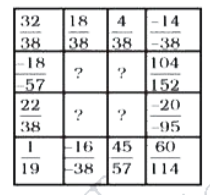Use the distributibity of multiplication of rational numbers over their addition to simplify: 27x(716−214) (ii) 34x (89−40)
Step by step video solution for Use the distributibity of multiplication of rational numbers over their addition to simplify: 2/7x(7/(16)-(21)/4) (ii) 3/4x\ (8/9-40) by Maths experts to help you in doubts & scoring excellent marks in Class 8 exams.
Updated on:21/07/2023Topper's Solved these Questions
- RATIONAL NUMBERS BOOK - NCERT EXEMPLARCHAPTER - RATIONAL NUMBERS EXERCISE - Games and Puzzles
1 Video
- RATIONAL NUMBERS BOOK - NCERT EXEMPLARCHAPTER - RATIONAL NUMBERS EXERCISE - Think and Discuss
1 Video
- RATIONAL NUMBERS BOOK - NCERT EXEMPLARCHAPTER - RATIONAL NUMBERS EXERCISE - Exercise (true(T) or false (F))
52 Videos
- PLAYING WITH NUMBERS BOOK - NCERT EXEMPLARCHAPTER - PLAYING WITH NUMBERS EXERCISE - Think and Discuss
1 Video
- SQUARE - SQUARE ROOT AND CUBE-CUBE ROOTBOOK - NCERT EXEMPLARCHAPTER - SQUARE - SQUARE ROOT AND CUBE-CUBE ROOTEXERCISE - Exercise
52 Videos
Similar Questions
Given below is a magic square. Place the numbers 7095,−21−133,2595,2438 in the appropriate squares so that sum in each row, column and diagonal is equal.

Hint: (Rewrite each rational number in its lowest term.)
View SolutionSome other easier ways to find the answer.
Is the product greater than both the rational numb or less than both the rational numbers?
View SolutionIf xy is a rational number, then y is always a whole number.
View SolutionWhat would be the value of y, if 277y is divisible by 11?
View SolutionWrite the Pythagorean triplet whose one of the numbers is 4.
View SolutionDistributivity of multiplication over addition the multiplication of rational numbers is distributive over their addiction.
View SolutionUsing commutativity and associativity of addition of rational numbers, express each of the following as a rational number:
(i)25+73+−45+−13
(ii) 37+−49+−117+79
View SolutionUsing commutativity and associativity of addition of rational numbers, express each of the following as a rational number:
(i)25+83+−1115+45+−23
(ii) 47+ 0+−89+−137+1721
View SolutionUse the distributibity of multiplication of rational numbers over their addition to simplify:
(i)35× (3524+101)
(ii) −54×(85+165)
View SolutionUse the distributibity of multiplication of rational numbers over their addition to simplify:
(i)27×(716−214)
(ii) 34× (89−401)
View SolutionSimplify (4x^(2)+7x)/(2x-3)+(9+7x)/(3-2x)
View SolutionSimplify: (47+−89+−521+13).
View SolutionWhich of the following rational numbers are equal?
(i) −721 and 3−9
(ii) −8−14 and 1321
View SolutionUsing commutativity and associativity of addition of rational numbers, express each of the following as a rational number: 25+73+−45+−13 (ii) 37+−49+−117+79
View SolutionUsing commutativity and associativity of addition of rational numbers, express each of the following as a rational number: 25+83+−1115+45+−23 (ii) 47+ 0+−89+−137+1721
View SolutionUse the distributibity of multiplication of rational numbers over their addition to simplify: (i)35× (3524+101) (ii) −54×(85+165)
View Solution
